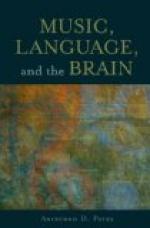There is one curious fact about all but the most musical children when they begin to write down tunes of their own composition. They make mistakes which they have never made when extemporizing the same type of tune. This seems to arise from the fact that they suddenly feel self-conscious—they have more time to think when writing than when singing or playing, and are inclined to compose one bar at a time instead of phrase by phrase. They will produce a tune of seven bars—they will end on a weak beat—they will come to a full stop in the middle of an eight-bar tune on the tonic chord, root at the top—the last half of the tune will have nothing to do with the first half. We could write a page of their possible mistakes!
The cure for these lapses is to insist on the tunes being sung before being written. The old unconscious habit will then assert itself, and the little tunes will fall into shape.
It is a useful lesson to get a class to criticize all original tunes when played by the young composer. For one thing, the criticism of our contemporaries often carries more weight than that of our elders; and for another, the practice arouses the critical faculty, and teaches the children to listen keenly, for they have not the written tune in front of them.
After a little practice quite good criticisms will be given by children. They will notice such points as a weak scheme of keys—undue repetition of the chief melody—a clumsy modulation—a trite ending—an over-laboured sequence—a tendency to borrow ideas from others, and so on.
This training will be of the greatest possible value to them later on in the concert-room. As a writer in The Times once put it:
’The vague impressions which are all that many people carry away from the concert-room would be replaced by definite experiences.
* * * * *
’Mental analysis is not, of course, the main object in listening to music, but it is a most powerful aid to full appreciation. It is the failure to perceive any definite relation between the parts and the whole that baffles so many people, and sends them away from the concert-room remarking that they cannot understand “classical” music.’
CHAPTER XI
THE TEACHING OF TRANSPOSITION
A great many musical people will not take up the subject of transposition seriously, because they have no idea of the lines along which to work. They all agree that the knowledge would be most useful to them, especially from the point of view of song accompaniment, but the path seems to be beset by so many difficulties, and the results of their first attempts are so pitifully small, that they generally give up all hope, and all effort. Then again, some of the books published on the subject are not very helpful to the average student. Some of them seem to start with the assumption that the student is very musical, and can do a great deal by instinct. They therefore give only the roughest directions. Others begin sensibly enough, but leave out so many steps in the work that a student may be forgiven for throwing them aside in despair.




